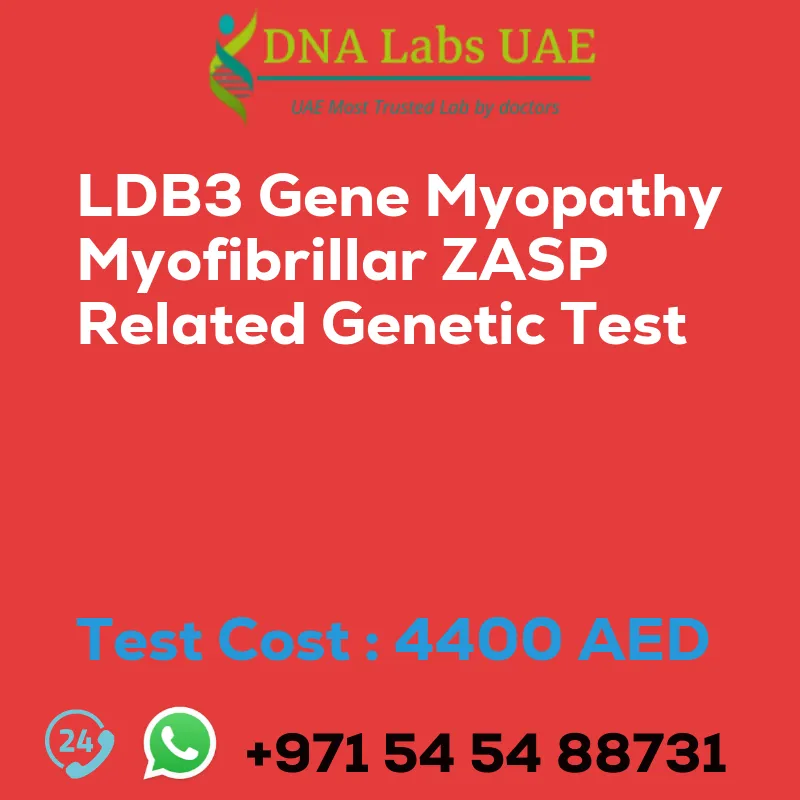LDB3 Gene Myopathy myofibrillar ZASP related Genetic Test
Cost: AED 4400.0
Symptoms and Diagnosis
LDB3 gene myopathy, myofibrillar, ZASP related NGS genetic test is a type of genetic test that is used to detect mutations in the LDB3 gene. This gene is associated with a type of myopathy called myofibrillar myopathy, which is characterized by muscle weakness and wasting.
Test Components
- Price: AED 4400.0
- Sample Condition: Blood or Extracted DNA or One drop Blood on FTA Card
- Report Delivery: 3 to 4 Weeks
- Method: NGS Technology
- Test Type: Neurological Disorders
- Doctor: Neurologist
- Test Department: Genetics
Pre Test Information
Clinical History of Patient who is going for LDB3 Gene Myopathy, myofibrillar, ZASP related NGS Genetic DNA Test A Genetic Counselling session to draw a pedigree chart of family members affected with LDB3 Gene Myopathy, myofibrillar, ZASP related.
Test Details
LDB3 gene myopathy, myofibrillar, ZASP related NGS genetic test is a type of genetic test that is used to detect mutations in the LDB3 gene. This gene is associated with a type of myopathy called myofibrillar myopathy, which is characterized by muscle weakness and wasting. The LDB3 gene provides instructions for making a protein called ZASP, which plays a role in the structure and function of muscle cells.
Mutations in the LDB3 gene can disrupt the normal function of ZASP, leading to the development of myofibrillar myopathy. NGS (Next-Generation Sequencing) technology is used in this genetic test to analyze the DNA sequence of the LDB3 gene and identify any mutations or variations that may be present.
This test can help in confirming a diagnosis of myofibrillar myopathy and determining the specific genetic cause of the condition. By identifying the specific mutation in the LDB3 gene, this genetic test can also provide information about the inheritance pattern of the condition, which can be helpful for genetic counseling and family planning.
It is important to note that this genetic test is typically ordered by a healthcare professional, such as a geneticist or a neurologist, and the results should be interpreted in the context of the individual’s clinical symptoms and family history. Genetic counseling is often recommended before and after undergoing genetic testing to discuss the potential implications and limitations of the test results.
| Test Name | LDB3 Gene Myopathy myofibrillar ZASP related Genetic Test |
|---|---|
| Components | |
| Price | 4400.0 AED |
| Sample Condition | Blood or Extracted DNA or One drop Blood on FTA Card o |
| Report Delivery | 3 to 4 Weeks |
| Method | NGS Technology |
| Test type | Neurological Disorders |
| Doctor | Neurologist |
| Test Department: | Genetics |
| Pre Test Information | Clinical History of Patient who is going for LDB3 Gene Myopathy, myofibrillar, ZASP related NGS Genetic DNA Test A Genetic Counselling session to draw a pedigree chart of family members affected with LDB3 Gene Myopathy, myofibrillar, ZASP related |
| Test Details |
LDB3 gene myopathy, myofibrillar, ZASP related NGS genetic test is a type of genetic test that is used to detect mutations in the LDB3 gene. This gene is associated with a type of myopathy called myofibrillar myopathy, which is characterized by muscle weakness and wasting. The LDB3 gene provides instructions for making a protein called ZASP, which plays a role in the structure and function of muscle cells. Mutations in the LDB3 gene can disrupt the normal function of ZASP, leading to the development of myofibrillar myopathy. NGS (Next-Generation Sequencing) technology is used in this genetic test to analyze the DNA sequence of the LDB3 gene and identify any mutations or variations that may be present. This test can help in confirming a diagnosis of myofibrillar myopathy and determining the specific genetic cause of the condition. By identifying the specific mutation in the LDB3 gene, this genetic test can also provide information about the inheritance pattern of the condition, which can be helpful for genetic counseling and family planning. It is important to note that this genetic test is typically ordered by a healthcare professional, such as a geneticist or a neurologist, and the results should be interpreted in the context of the individual’s clinical symptoms and family history. Genetic counseling is often recommended before and after undergoing genetic testing to discuss the potential implications and limitations of the test results. |








